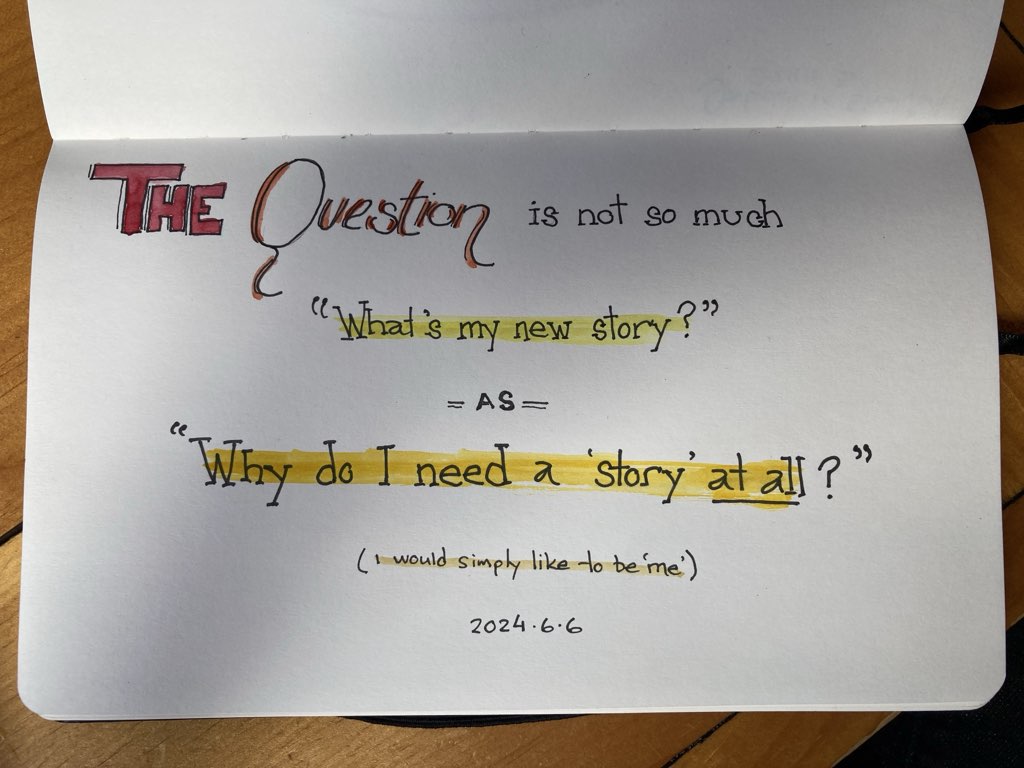Yesterday I was on the phone with Clar. He was calling to update me on some developments in the Parish Hall (where my print shop sits in the basement).
At the end of the call Clar asked “How’s Olivia?”
What he was asking me was to bring him up to date, with an amount of detail that lay somewhere between “Well, this morning she got up and had breakfast…” and “She’s doing ok.”
Clar wanted me to update him on “the story of Olivia.” To distill, summarize, keep the plot going.
His question was no different than the same question asked many times a week by friends and familiars. What are you up to? How are you? What’s keeping you busy these days?
What’s your story?
I have been thinking a lot about story of late. I made this sketch yesterday, sitting in the coffee shop:

I’ve been meeting with a coach, a practitioner of “radical aliveness,” since September. It’s been very helpful, in ways I’ve not experienced before. At the start of every session he prompts me to settle into how I’m showing up, to take a breath and connect with what I’m feeling. Last week my answer was “exhausted,” and much of what we discussed for the hour that followed was how I feel a deep need for a break.
I spent the week that followed thinking about the question “a break from what?” and where I landed yesterday was “a break from needing to have a story.”
When I think about the book I published after Catherine died, what I see it as now is a chain of attempts to present a cogent updated story. Each chapter is an email update to friends and family, and in each update I sought to distill the essence of the health and treatment and options and cataclysmic events into some variation of “it’s okay, this is how things are now.”
So, August 5, 2016:
Catherine spent most of the day waiting for a 5 minute conversation to happen.
I won’t bury the lede: the 5 minute conversation, when it happened, was a good one; the MRI she had taken this morning showed no evidence of anything interfering with her spinal cord. Which means that fears of paralysis, or other neurological side-effects, are off the table.
Or August 6, 2019, three years later:
When I last wrote, in early July, Catherine had just that morning had a cycle of chemotherapy, and things were going relatively well. The week that followed was a challenging one, as that chemo packed a particular wallop, and Catherine was exhausted, in pain, and generally feeling like she’d been poisoned. Which, of course, she had been. Over time things got a little better for her, but it’s continued to be a hard month for pain management, and the oppressive heat hasn’t helped.
Like that, over and over, for almost 6 years. Every pithy update akin to sending out grappling hooks to the walls of the caverns we happened to find ourselves in.
It helped. Both me, in the telling, and those who received the updates.
But it was exhausting. Not so much the writing, which comes naturally, but in the conjuring up the description of the cavern and the grappling hooks, the sense-making. The storytelling.
After Catherine died, the book ended (with my eulogy for Catherine, the ultimate story, “This was Catherine”).
I kept conjuring stories, kept sending out grappling hooks. Widower. Grieving. Not grieving. Powering through grief. Getting help with grief. Caregiver. Single man. Dating man. Lonely man. Author. Father. Each got attached to a story, some of which I told here. And each story had to make sense, to be explainable, every feeling justified.
In her excellent book Why Not Me?, Barbara Want writes about entering into a new relationship soon after the death of her husband:
Why did I do it? I asked myself the question many a time. And I’m sure others wondered too. Was it wise to embark on a relationship so soon after my husband had died? Was I in a fit state to know what I was doing? Was it fair on R., to allow him to engage with someone whose emotions were pulped, whose thinking was at times irrational?
What nobody other than widows and widowers can understand is the enormous all-consuming weight, from within and without, reflected in that passage.
If you are compelled to conjure stories, the journey from bereaved onward is a minefield. Who am I? Who was I? Who do others think I am? Is this ok? Am I ok?
I’ve lived through it all. I know.
So I would like to stop.
I need a break from telling my story to myself.
I need a break from filling in the blank after “Right now I’m the kind of person who…”
I would simply like to be me.
This isn’t an easy thing to undertake: I’ve venerated the art of storytelling for so long, it’s so firmly entrenched a habit, that turning it off seems like cutting out a part of my brain.
What I’ve been gifted, through weekly sessions with my coach, however, is a taste of what it feels like to be free from it. To be present in a moment, without a need to explain it. To let feelings exist without needing to tether them to antecedents or solutions.
That feeling is delicious.
Hard to get to. Shaky-feeling.
But delicious.
 I am
I am
Comments
<3
<3
Add new comment